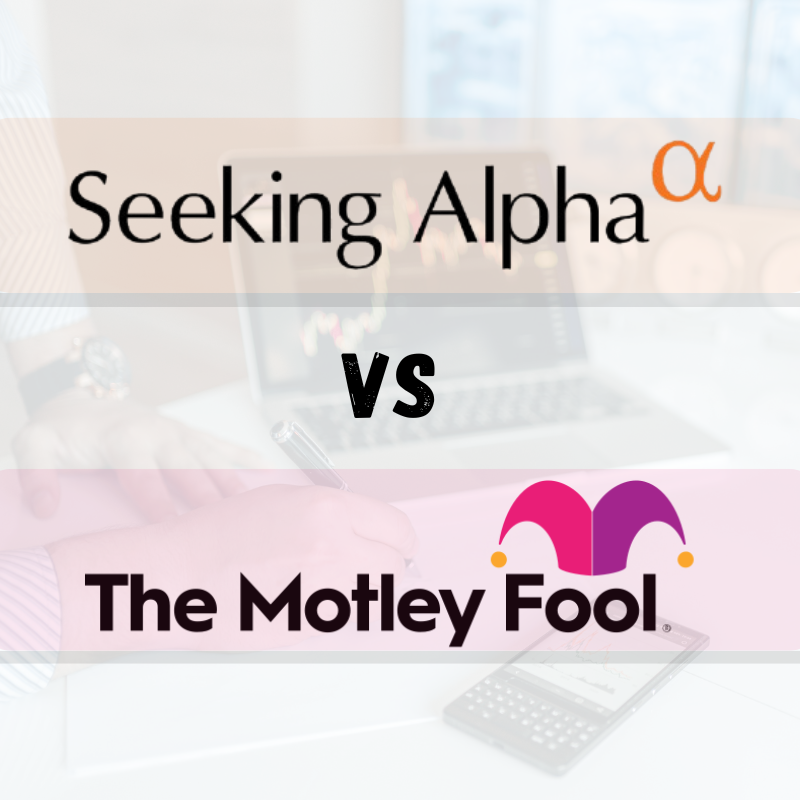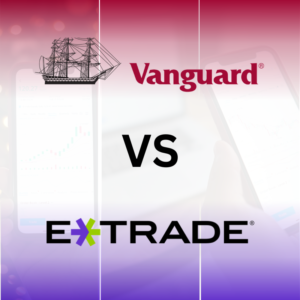Investors often find themselves comparing Seeking Alpha vs Motley Fool when searching for the best platform to guide their financial decisions. Both platforms offer unique tools, insights, and strategies, but which one aligns with your investment goals? In this detailed comparison, we’ll break down their features, pricing, target audiences, and more to help you make an informed choice.
Table of Contents
Overview and Purpose
Seeking Alpha vs Motley Fool are two popular platforms catering to investors looking to make informed decisions. Both provide a wealth of resources, but their core purposes differ, appealing to slightly different audiences.
Seeking Alpha focuses on providing a platform for crowdsourced stock analysis and in-depth financial insights. It attracts both beginner and advanced investors with its mix of free and premium content. Contributors on Seeking Alpha include financial experts, analysts, and experienced investors who share their perspectives on stocks, ETFs, and market trends. Its primary goal is to empower users with diverse viewpoints to aid in making well-informed investment decisions.
Motley Fool, on the other hand, is known for its curated and highly actionable investment advice. Its focus lies in long-term stock recommendations based on comprehensive research and analysis. Motley Fool caters to those seeking guidance in building a robust portfolio with a focus on quality over quantity. Its flagship service, Stock Advisor, highlights monthly stock picks intended for long-term growth, making it a go-to platform for investors aiming to achieve steady returns.
Both platforms aim to help investors succeed but approach this goal differently. Seeking Alpha offers a broader range of tools for independent analysis, while Motley Fool simplifies the decision-making process with clear, researched recommendations.
Content Type
When comparing Seeking Alpha vs Motley Fool, their content offerings differ significantly, catering to different styles of investment research and decision-making.
Seeking Alpha delivers a mix of articles, opinions, and research reports on a wide range of topics. These include stock analysis, market commentary, and investment ideas. The platform features both user-generated content and articles by financial professionals, creating a diverse pool of insights. Premium members get access to in-depth reports, earnings call transcripts, and quant ratings, which are useful for investors who prefer conducting their own analysis.
Motley Fool, on the other hand, focuses on curated stock picks and straightforward investment advice. The content is designed to be concise and actionable, catering to investors who want clear guidance without sifting through extensive analysis. Services like Stock Advisor and Rule Breakers highlight specific stocks and explain why they have growth potential. Motley Fool prioritizes long-form analysis for its recommendations while avoiding excessive technical jargon, making it approachable for less experienced investors.
In summary, Seeking Alpha provides a diverse range of content for DIY investors, while Motley Fool specializes in focused, expert-curated recommendations for building long-term portfolios. The choice depends on whether you prefer a hands-on or guided approach to investing.
User Experience
User experience is a key factor when evaluating Seeking Alpha vs Motley Fool. Both platforms have distinct designs and features tailored to their respective audiences.
Seeking Alpha provides a customizable and feature-rich interface, making it ideal for investors who prefer exploring detailed financial data and research. The platform allows users to follow specific authors, track portfolios, and access tailored stock analysis. However, the abundance of tools and content can feel overwhelming for beginners. The mobile app is well-designed, enabling on-the-go access to essential features like news updates, portfolio tracking, and premium insights.
Motley Fool, in contrast, is designed for simplicity and ease of navigation. Its website and app prioritize delivering clear stock recommendations and investment advice without unnecessary distractions. The focus is on providing concise, actionable insights, making it easy for users to find and implement stock picks. While it lacks the in-depth tools and customization of Seeking Alpha, its streamlined approach is ideal for investors who want a straightforward experience.
In summary, Seeking Alpha offers a more complex but powerful user experience for hands-on investors, while Motley Fool provides a simplified, user-friendly platform for those who prefer guided recommendations.
Membership Plans and Pricing
When comparing Seeking Alpha vs Motley Fool, their membership plans and pricing structures reflect their distinct approaches to serving investors.
Seeking Alpha offers a free plan that grants access to basic articles and community-driven content. For more advanced features, it provides premium memberships. The Premium Plan costs around $239 annually and includes access to exclusive content such as in-depth research reports, quant ratings, and earnings call transcripts. For even deeper insights, the Pro Plan, priced at $2,400 per year, caters to professional investors and includes top ideas from leading contributors, advanced screening tools, and priority customer support.
Motley Fool’s pricing model revolves around its flagship services. The Stock Advisor Plan, priced at $199 per year, provides monthly stock recommendations with detailed research. Another popular service, the Rule Breakers Plan, also priced at $199 annually, focuses on high-growth stocks. Motley Fool offers bundled pricing for access to multiple services, but its recommendations are more focused than Seeking Alpha’s broad offerings. Unlike Seeking Alpha, Motley Fool does not have a free membership tier, though it occasionally offers discounts on its plans.
In summary, Seeking Alpha provides tiered pricing with options for general investors and professionals, while Motley Fool focuses on fixed-price plans for actionable stock recommendations. The choice depends on whether you value breadth of tools or focused advice.
Stock Recommendations
Stock recommendations are a major factor when deciding between Seeking Alpha vs Motley Fool. Both platforms approach recommendations differently, catering to varying investor preferences.
Seeking Alpha provides a wide range of stock analysis and opinions contributed by individual investors, analysts, and professionals. Its stock recommendations are less centralized and rely on diverse viewpoints, which can be helpful for users who prefer to weigh multiple perspectives. Premium subscribers gain access to quant ratings, a proprietary scoring system that evaluates stocks based on metrics like growth, profitability, and value. While Seeking Alpha offers detailed insights, it leaves the final decision-making in the hands of the investor.
Motley Fool, on the other hand, is known for its clear and actionable stock recommendations. Its flagship services, like Stock Advisor and Rule Breakers, provide two hand-picked stock picks per month with detailed explanations on why they are expected to perform well. Motley Fool focuses on long-term investments, often targeting high-growth companies with strong fundamentals. This approach is ideal for investors who want a curated selection without diving deeply into analysis.

In summary, Seeking Alpha is better suited for investors who want to explore a variety of recommendations and perform their own due diligence, while Motley Fool appeals to those seeking straightforward, well-researched stock picks for long-term growth.
Research Tools
When comparing Seeking Alpha vs Motley Fool, it’s essential to understand the research tools each platform offers to assist investors in making informed decisions.
Seeking Alpha provides a comprehensive suite of tools, including advanced stock screeners, quant ratings, and access to earnings call transcripts. These features cater to investors who prefer conducting their own in-depth analysis.
Motley Fool, in contrast, focuses on delivering curated stock picks accompanied by detailed analyses, simplifying the research process for users who prefer guided recommendations.
For a broader comparison of top online brokers and trading platforms, you might find Investopedia’s guide on the BestOnline Brokers and Trading Platforms for December 2024 insightful. This resource provides an in-depth analysis of various platforms, helping you make an informed decision tailored to your investment goals.
In summary, both Seeking Alpha and Motley Fool offer valuable research tools, each catering to different investor preferences. Exploring external reviews and comparisons can further assist in determining which platform aligns best with your investment strategy.
Community Engagement
Community engagement is an important factor to consider when evaluating Seeking Alpha vs Motley Fool, as it shapes how users interact with each platform and gain insights from others.
Seeking Alpha thrives on its active community of contributors and readers. It allows users to comment on articles, share insights, and discuss investment strategies. This interactive approach fosters a dynamic exchange of ideas, with both amateur and professional investors participating. Premium members benefit from access to exclusive forums and discussions, enhancing collaboration within the community. Seeking Alpha’s community-driven content is ideal for investors who value diverse perspectives and want to engage in conversations about market trends and stock analysis.
Motley Fool, on the other hand, focuses less on community discussions and more on delivering curated insights from its in-house experts. While there are forums and opportunities to engage with other subscribers, the platform’s primary focus remains on its recommendations and premium content. Motley Fool’s community engagement is more structured and moderated, making it a good fit for investors who prefer to consume content rather than actively participate in discussions.
In summary, Seeking Alpha offers robust community engagement with opportunities for discussion and collaboration, while Motley Fool takes a more curated, expert-driven approach with limited interactivity.
Target Audience
Community engagement is an important factor to consider when evaluating Seeking Alpha vs Motley Fool, as it shapes how users interact with each platform and gain insights from others.
Seeking Alpha thrives on its active community of contributors and readers. It allows users to comment on articles, share insights, and discuss investment strategies. This interactive approach fosters a dynamic exchange of ideas, with both amateur and professional investors participating. Premium members benefit from access to exclusive forums and discussions, enhancing collaboration within the community. Seeking Alpha’s community-driven content is ideal for investors who value diverse perspectives and want to engage in conversations about market trends and stock analysis.
Motley Fool, on the other hand, focuses less on community discussions and more on delivering curated insights from its in-house experts. While there are forums and opportunities to engage with other subscribers, the platform’s primary focus remains on its recommendations and premium content. Motley Fool’s community engagement is more structured and moderated, making it a good fit for investors who prefer to consume content rather than actively participate in discussions.

In summary, Seeking Alpha offers robust community engagement with opportunities for discussion and collaboration, while Motley Fool takes a more curated, expert-driven approach with limited interactivity.
Ease of Use
Ease of use is an important factor when comparing Seeking Alpha vs Motley Fool, as it influences how effectively users can navigate each platform and access their features.
Seeking Alpha offers a robust and feature-rich interface, which may feel complex for beginners but provides significant value to experienced investors. Its dashboard is customizable, allowing users to track portfolios, read articles, and analyze financial data in one place. However, the sheer volume of tools and content can be overwhelming for those new to investing. The mobile app is a streamlined version of the website, making it easier to access essential features like news updates and stock analysis on the go.
Motley Fool, in contrast, emphasizes simplicity and clarity. The platform’s user interface is straightforward, guiding users directly to stock recommendations and analysis without distractions. Its focus is on delivering curated insights, making it easy for investors to follow actionable advice without needing to navigate through complex tools or menus. This approach is particularly beneficial for beginners or those looking for quick, actionable guidance without diving into technical analysis.
In summary, Seeking Alpha’s extensive tools make it powerful but slightly more complex to use, while Motley Fool’s clean and simplified interface ensures a beginner-friendly experience. The choice depends on whether you prioritize functionality or simplicity.
Educational Resources
Educational resources are a key aspect to consider when comparing Seeking Alpha vs Motley Fool, especially for investors looking to deepen their knowledge and skills.
Seeking Alpha provides a wealth of educational content indirectly through its articles, market commentary, and analysis. While it doesn’t have a dedicated section for investor education, the platform’s diverse range of user-generated and expert-contributed articles helps users learn about market trends, stock analysis techniques, and financial strategies. Premium subscribers gain access to advanced tools like quant ratings, which can be educational for those learning to interpret financial metrics.
Motley Fool, on the other hand, is more structured in its approach to investor education. It offers easy-to-understand guides, tutorials, and explanations tailored to beginners and intermediate investors. These resources complement its stock recommendations by helping users understand why specific stocks are chosen. Motley Fool’s focus on long-term investment strategies also helps educate users about building sustainable portfolios, making it an excellent platform for learning the basics of investing.
In summary, Seeking Alpha is better for investors who learn by exploring real-world analysis, while Motley Fool provides structured, beginner-friendly educational resources alongside its recommendations.
Performance and Credibility
Educational resources are a key aspect to consider when comparing Seeking Alpha vs Motley Fool, especially for investors looking to deepen their knowledge and skills.
Seeking Alpha provides a wealth of educational content indirectly through its articles, market commentary, and analysis. While it doesn’t have a dedicated section for investor education, the platform’s diverse range of user-generated and expert-contributed articles helps users learn about market trends, stock analysis techniques, and financial strategies. Premium subscribers gain access to advanced tools like quant ratings, which can be educational for those learning to interpret financial metrics.
Motley Fool, on the other hand, is more structured in its approach to investor education. It offers easy-to-understand guides, tutorials, and explanations tailored to beginners and intermediate investors. These resources complement its stock recommendations by helping users understand why specific stocks are chosen. Motley Fool’s focus on long-term investment strategies also helps educate users about building sustainable portfolios, making it an excellent platform for learning the basics of investing.
In summary, Seeking Alpha is better for investors who learn by exploring real-world analysis, while Motley Fool provides structured, beginner-friendly educational resources alongside its recommendations.
Customer Support and Reviews
When comparing Seeking Alpha vs Motley Fool, customer support and user reviews provide valuable insights into each platform’s service quality and user satisfaction.
Seeking Alpha offers customer support primarily via email for general inquiries, account management, and technical issues. Premium and Pro subscribers often receive priority assistance, ensuring quicker responses. However, some users report that response times can vary, and live chat or phone support options are not currently available. User reviews of Seeking Alpha highlight its extensive content and tools but note a learning curve for beginners and occasional inconsistency in article quality.
Motley Fool provides a more robust customer support system, including email and phone support during business hours. Its team is responsive and well-equipped to handle subscription-related queries and technical issues. Motley Fool consistently earns positive reviews for its straightforward and actionable stock recommendations. Many users praise the platform for its simplicity and transparency, though some feel the pricing is steep for certain plans.

In summary, Seeking Alpha provides adequate support but lacks live interaction options, while Motley Fool offers more accessible customer service. Reviews reflect that both platforms are well-regarded, with Seeking Alpha praised for its tools and Motley Fool for its reliable guidance.
Conclusion
Choosing between Seeking Alpha vs Motley Fool ultimately depends on your investing style, goals, and preferences. Seeking Alpha is ideal for hands-on investors who prefer conducting their own research with access to diverse insights, advanced tools, and in-depth analysis. On the other hand, Motley Fool shines for those who value simplicity and expert-curated stock recommendations, particularly for long-term growth strategies.
Both platforms offer distinct advantages. Seeking Alpha provides a wealth of resources for independent investors, while Motley Fool simplifies decision-making with proven, actionable advice. Whether you prefer a DIY approach or guided expertise, evaluating the specific features, pricing, and community engagement of each platform will help you determine the best fit for your investment journey.
For a comprehensive analysis of investment platforms, you might find our article on Arrived vs Fundrise 2024 – Which is the Best Online Investing Platform insightful.





